六年级英语时态复习.ppt
六年级下册英语-小升初总复习-时态全解-人教版PEP(共29张PPT)
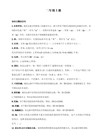
将来时理论
一、 概念:表示将要发生的动作或存在的状态及打算、 计划或准备做某事。 句中一般有以下时间状语: tomorrow, next day(week, month, year…),
soon, the day after tomorrow(后天) this morning , this afternoon , this evening等。
试题演练:
三、 选择正确的答案。 B presents for my parents yesterday. 1. I ____ A. buyed B. bought C. buying C 2. Susan _____ swimming yesterday. A. go B. goes C. went B 3. Danny _____ breakfast five times last week. A. eat B. ate C. eated C Tree Planting Day. 4. Last Sunday____ A. is B. were C. was
试题演练:
一、写出下列动词的过去式或动词原形。 went was 1. go_______ 2. is___________ Lorem ipsum dolor bought 3.buy_______ 5. have had ____
sit amet, consectetur adipisicing elit, sed do eiusmod tempor incididunt ut labore
swam 4.swim__________
6. watched watch _____
eat 7. ate______
get 8. got__________
英语语法专项复习一般现在时教学课件2

For example
She gets up early every morning.
她每天早上早起。
I go to see my grandmother every month.
我每个月都去看我的奶奶。
01 概念与用法
一般现在时的构成结构
Be动词
动词原形
动词三单
01 概念与用法
Be动词的一般现在时的构成
如:guess-guesses wash-washes
watch-watches go-goes do-does 3.以“辅音字母+y”结尾,变y为i, 再加-es:
如:study-studies fly-flies
练习:
一、 写出下列动词的第三人称单数 (2分)
drink __d_r_in_k__s_ go __g_o_e_s_
Part. two
动词变化规则
02 动词变化规则
肯定句结构
1、I play football every day . 2、My friends play football every day . 3、He plays football every day . 4、Tom plays football every day .
肯定变否定,be后加not
01 概念与用法
一般疑问句结构变化
Are you a good person? Is she/he a good person.
肯定句变一般疑问句,只需将 be动词提前
行为动词 的一般现在时是怎么构成的呢?
01 概念与用法
观察下列句子
1、I play football every day . 2、You play football every day . 3、My friends play football every day . 4、He plays football every day . 5、Tom plays football every day . 6、My brother plays football every day .
小升初必会四大时态(课件)-2023-2024学年人教PEP版英语六年级下册

A. Do; go
B. Did; went C. Did; go
3. My brother _______ a skirt for me yesterday.
A. bought
B. buys
C. buy
版权声明
感 谢 您 下 载 平 台 上 提 供 的PPT 作 品 , 为了 您 和熊 猫 办公 以 及原 创 作者 的 利益 , 请勿 复 制、 传 播、 销 售, 否 则将 承 担法 律 责任 ! 熊猫 办 公将 对作品进行维权,按照传播下载次数进行十倍的索取赔偿!
一般过去时—— Exercises
三、单项选择。
1. Bill likes reading. He_____ books with his dad every evening.
A. read B. reads C. is reading D. has read
2. He often _______ football in the school.
1 . 在 熊 猫 办 公 出 售 的 PPT 模 板是 免 版税 类 (R F : Ro yal ty-F re e )正 版 受《 中 国人 民 共 和国 著 作法 》 和《 世 界版 权 公约 》 的保 护 ,作 品 的 所 有 权 、 版 权 和 著 作权 归 熊猫 办 公所 有 ,您 下 载的 是 PPT 模 板素 材 的使 用 权。 2 . 不 得 将 熊 猫 办 公 的 PPT 模 板、 PPT 素 材 ,本 身 用于 再 出售 , 或者 出 租、 出 借、 转 让、 分 销、 发 布或 者 作为 礼 物供 他 人使 用 ,不 得 转授 权、出卖、转让本协议或者本协议中的权利。
一般过去时—— Exercises
小学六年级英语语法总复习PPT课件

• 小学阶段不规则动词全表
• Infinitive Past tense Infinitive
• 1. am, is
was
2. keep
• 3.are
were
5. make made
4.become
7. blow
blew
8. read
• 9. buy
bought
10. ride
• 11. catch caught
fly-flying walk-walking
jump-jumping sleep-sleeping
climb-climbing fight-fighting
swing-swinging drink-drinking catch-catching pick-picking
watch-watching play-playing
dance danced
变y为 i+ed
study studied
动词的过去式(不规则)
go-went read-read eat-ate sing-sang take-took buy-bought see-saw swim-swam am,is-was do-did are-were have-had get-got leave-left fly-flew stop-stopped(双写)
.
• 一般现在时的变化
1. be动词的变化。
否定句:主语+ be + not +其它。 如:He is not a worker.他不是工人 一般疑问句:Be +主语+其它。 如:-Are you a student? -Yes. I am. / No, I‘m not. 特殊疑问句:疑问词+一般疑问句。如:Where is my bike?
小学六年级下册英语小升初时态课件(通用版) 一般过去时总复习2

4.疑问was/were调句首
• Were you at home the day before yesterday﹖ • Was she happy this morning﹖
肯定回答 Yes, 主语+was/were. 否定回答 No, 主语+wasn't/weren't. Were Xiao Qiang and Xiao Long here just now﹖
• yesterday或以其构成的短语: • yesterday morning • yesterday afternoon • yesterday evening • the day before yesterday
three days ago
Miss Zhu went to Tiantian Market three days ago.
其他家族
Long long ago
yesterday Now
一般过去时 yesterday ago just now in the old days in those days in 1980 the other day at that time once upon a time
一般将来时
现在 进行
• 现在学过的常用的表示过去的时间状语有: just now,a moment ago,yesterday,last week,last night, last weekend,last year,last month,three days ago,two weeks ago,five years ago…
• (3)末尾只有一个元音字母和一个辅音字母的重读闭音节,应 双写末尾的辅音字母,再加-ed,如:stop-stopped, shop-
六年级英语总复习(时态-语法)
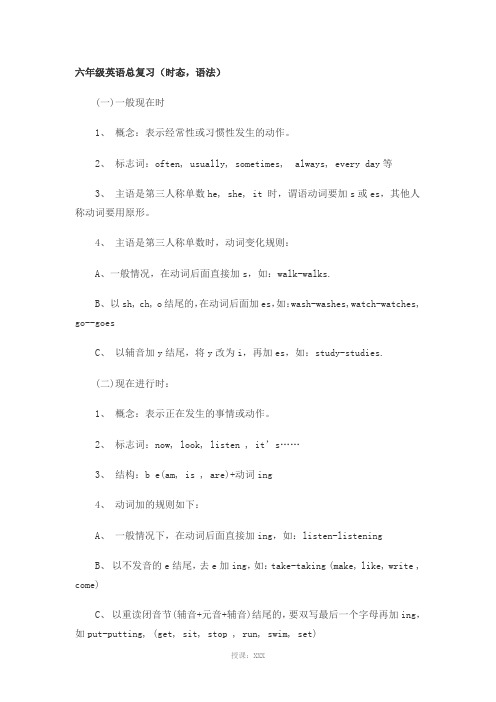
六年级英语总复习(时态,语法)(一)一般现在时1、概念:表示经常性或习惯性发生的动作。
2、标志词:often, usually, sometimes, always, every day等3、主语是第三人称单数he, she, it 时,谓语动词要加s或es,其他人称动词要用原形。
4、主语是第三人称单数时,动词变化规则:A、一般情况,在动词后面直接加s,如:walk-walks.B、以sh, ch, o结尾的,在动词后面加es,如:wash-washes,watch-watches, go--goesC、以辅音加y结尾,将y改为i,再加es,如:study-studies.(二)现在进行时:1、概念:表示正在发生的事情或动作。
2、标志词:now, look, listen , it’s……3、结构:b e(am, is , are)+动词ing4、动词加的规则如下:A、一般情况下,在动词后面直接加ing,如:listen-listeningB、以不发音的e结尾,去e加ing,如:take-taking (make, like, write , come)C、以重读闭音节(辅音+元音+辅音)结尾的,要双写最后一个字母再加ing,如put-putting, (get, sit, stop , run, swim, set)但:see-seeing, eat –eating.(三)一般将来时:1、概念:表示将要发生的事或打算,计划要做的事。
2、标志词:this weekend, next Monday, tomorrow, in seven years’ time3、结构:be(am, is , are) going to +动词原形或者 Will+动词原形如:I am going to take a trip next week.4、否定句:be+not going to +动词原形或者 Will+not(等于won’t)+动词原形(四)一般过去时:1、概念:表示在过去的时间里所发生的事或动作。
六年级英语时态总复习
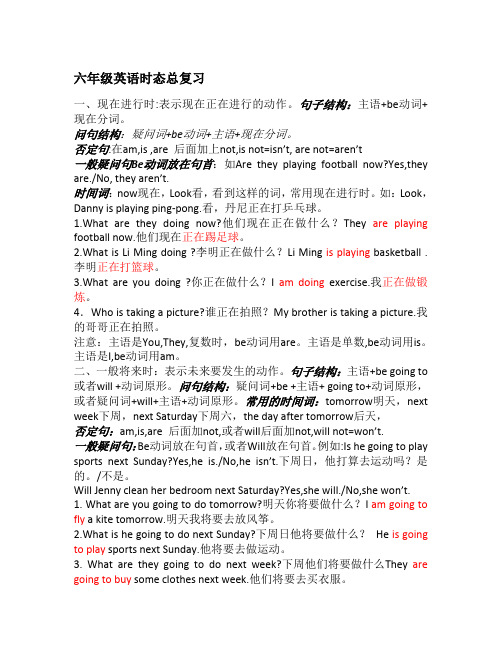
六年级英语时态总复习一、现在进行时:表示现在正在进行的动作。
句子结构:主语+be动词+现在分词。
问句结构:疑问词+be动词+主语+现在分词。
否定句:在am,is ,are 后面加上not,is not=isn’t, are not=aren’t一般疑问句Be动词放在句首:如Are they playing football now?Yes,they are./No, they aren’t.时间词:now现在,Look看,看到这样的词,常用现在进行时。
如:Look,Danny is playing ping-pong.看,丹尼正在打乒乓球。
1.What are they doing now?他们现在正在做什么?They are playing football now.他们现在正在踢足球。
2.What is Li Ming doing ?李明正在做什么?Li Ming is playing basketball .李明正在打篮球。
3.What are you doing ?你正在做什么?I am doing exercise.我正在做锻炼。
4.Who is taking a picture?谁正在拍照?My brother is taking a picture.我的哥哥正在拍照。
注意:主语是You,They,复数时,be动词用are。
主语是单数,be动词用is。
主语是I,be动词用am。
二、一般将来时:表示未来要发生的动作。
句子结构:主语+be going to 或者will +动词原形。
问句结构:疑问词+be +主语+ going to+动词原形,或者疑问词+will+主语+动词原形。
常用的时间词:tomorrow明天,next week下周,next Saturday下周六,the day after tomorrow后天,否定句:am,is,are 后面加not,或者will后面加not,will not=won’t.一般疑问句:Be动词放在句首,或者Will放在句首。
六年级英语时态综合复习现在进行时课件.ppt

现在进行时
The Present Continuous Tense
现在进行时态表示现在(说话瞬间)正在进行或发生的动作。 标志词:now(现在) look(看) listen(听)等。
现在进行时的基本构成
• 人称+be动词+动词ing形式 注:be动词随人称的变化而变化
Play a game (火眼金睛)
现在进行时的句子形式
第一人称+am+v-ing 第二人称+are+v-ing 第三人称+is+v-ing • 单数+is+v-ing • 复数+are+v-ing
我用am, 你用are, is跟着他,她,它
Fill in the blacks
1.The child ___is__o_p_e_n_in_g___the windows now.(open) 2.The boy ___is_d_r_a_w_i_n_g____ a picture now.(draw) 3.Look! She ___is_r_e_a_d_in_g______ a book.(read) 4.I __a_m__w_r_i_ti_n_g__an e-mail to my friend now.(write) 5.Look!Sarah__i_s_m__a_k_in_g__th_e__b_ed____.(make the bed) 6.Listen!The students__a_r_e_s_i_n_g_in_g_______.(sing) 7.We ____a_re__ru_n_n_i_n_g___ to school now.(run)
现在进行时的句子形式: 主语+be动词+动词的现在分词
小升初小学英语四大时态(课件)人教PEP版英语六年级下册
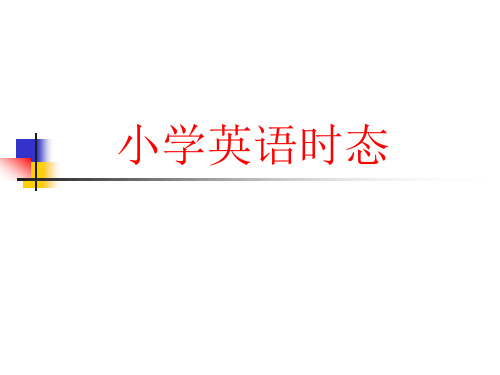
现在进行时
句型:主语+be+动词ing Tom is doing his homework.
第一人称+am+动ing 第二人称+are+动ing 第三人称+is+动ing 口诀:我用am,你用are,is用在他她它,单数名词使 用is ,复数名词使用are 定义:现在进行时表示现在或当前一般时间正在进行 的动作常与Listen,Look,now,Watch out…连用
cleaning
一般将来时
定义:表示将要发生的事或打算、计划、决定要 做的事情。常与tomorrow, tonight, next week/ weekend/ month/ year, this morning/ afternoon/ evening…连用
句型:主语+be going to+动词原形 主语+will+动词原形
现在进行时
动词ing的变化规律: 1)直接加ing ,如: open-opening, clean-
cleaning… 2) 去掉词尾不发音的e ,如:take-taking, come-
coming, have-having, become-becoming … 3) 重读闭音节的,双写最后的字母,加 ing , 如:
last year. 去年李梅总是步行上学。
动词过去式的规则变化
①一般情况,直接加上-ed。如:look-looked。 ②以不发音的字母e结尾的动词,加-d。如:
live-lived。 ③以重读闭音节结尾,先双写辅音字母,再加-
ed。如:stop-stopped
④辅音字母+y结尾的动词,先变y为i,再 加-ed。如:study-studied。
六年级英语时态专项复习
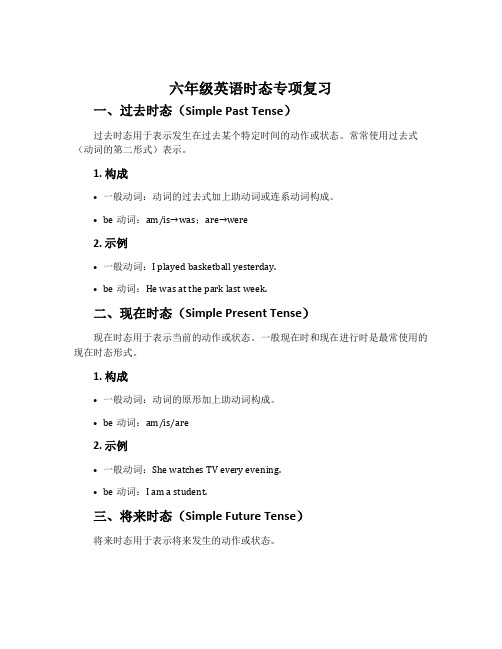
六年级英语时态专项复习一、过去时态(Simple Past Tense)过去时态用于表示发生在过去某个特定时间的动作或状态。
常常使用过去式(动词的第二形式)表示。
1. 构成•一般动词:动词的过去式加上助动词或连系动词构成。
•be动词:am/is→was;are→were2. 示例•一般动词:I played basketball yesterday.•be动词:He was at the park last week.二、现在时态(Simple Present Tense)现在时态用于表示当前的动作或状态。
一般现在时和现在进行时是最常使用的现在时态形式。
1. 构成•一般动词:动词的原形加上助动词构成。
•be动词:am/is/are2. 示例•一般动词:She watches TV every evening.•be动词:I am a student.三、将来时态(Simple Future Tense)将来时态用于表示将来发生的动作或状态。
•一般动词:will + 动词的原形构成。
•be动词:will be2. 示例•一般动词:I will visit my grandparents next week.•be动词:They will be at the party tomorrow.四、现在进行时(Present Continuous Tense)现在进行时用于表示现在正在进行的动作。
1. 构成•一般动词:am/is/are + 动词的现在分词构成。
2. 示例•一般动词:He is eating dinner right now.•be动词:They are playing football in the park.五、过去进行时(Past Continuous Tense)过去进行时用于表示过去某个时间正在进行的动作。
1. 构成•一般动词:was/were + 动词的现在分词构成。
2. 示例•一般动词:She was studying at the library last night.•be动词:They were sleeping when I called.六、现在完成时(Present Perfect Tense)现在完成时用于表示过去某个时间开始,一直延续到现在的动作或状态。
小学英语时态总复习(课件)度人教版PEP版英语六年级下册
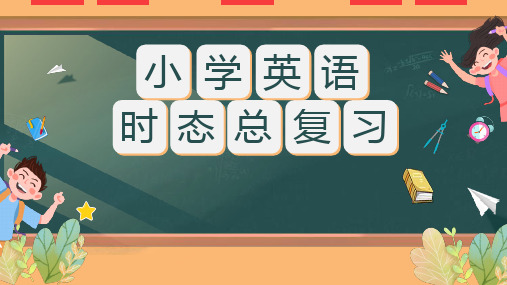
When did you clean the classroom?
yesterday
给对应的时态找到时间伙伴
用动词的正确形式填空 1. she __d_o_e_s_ (do) her homework every evening. 2. We ___f_l_y__ (fly) kites in the park on Sundays. 3. My mother __c_le_a_n_e_d_ (clean) our room last Sunday. 4. Tom __p__la_y_s_(play) the piano every Saturday. Now he_i_s_p_la_y_ing(play). 5. She __l_ik_e_s__(like) swimming. She i_s g_o_in_g_to__sw_im_(swim) next weekend. 6. Usually my mother _w_a_s_h_e_s_ (wash) the dishes after lunch. But my grandma_w_a_s_h_e_d_ (wash) yesterday. 7. Look at the man! He __is_r_e_a_d_i_n_g__ (read) a magazine. 8. _D__id_ (do)you__d_o(do)homework last weekend?
习惯性的 动作
爱好
Tip
经常发生
现在进行时态 表示正在发生的动作, 常与表示现在的时间 now, listen, look 连用
结构:
问:What+be动词+主语+doing? 答:主语+be动词+动词ing形式。 如:——What are you doing?
小学英语六年级下册专题复习——一般将来时(课件)

Is Piggy going to build a new house?
Yes, he is.
He is going to build a new house.
What is Piggy going to do ?
He is going to build a roof, make a window, build a door, find some food and invite Peggy to his house.
house.
smar
helpful
t
What is Piggy like?
hard-
...
working
Is Peggy going to build a roof?
No, she isn't. She isn't going to build a roof.
Is Peggy going to make a window?
No, she isn't.
She isn't going to make a window.
Is Peggy going to build a door?
No, she isn't.
Sheisn't going tobuild a door.
Is Peggy going to find any food for winter?
When will she build?
Where will she build ?
How will she build?
Piggy and Peggy live in the forest. Piggy is going build a new hsoommutasoekeefionaowtdhiefnodfroowrweinsattnetdor dabanuyd.iliHdinasevdgitooeoiPnr.egTgthgoeynbtohuehilidstiaoshrogouoosifne. .Hget_ois_f__gin_o_di_n_g
六年级英语语法复习:时态
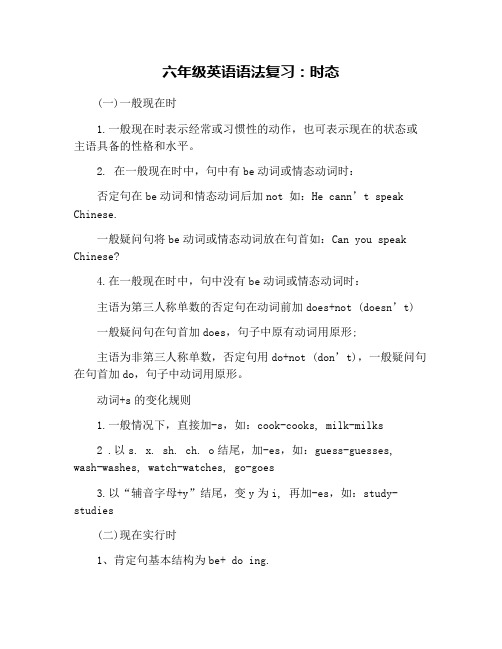
六年级英语语法复习:时态(一)一般现在时1.一般现在时表示经常或习惯性的动作,也可表示现在的状态或主语具备的性格和水平。
2. 在一般现在时中,句中有be动词或情态动词时:否定句在be动词和情态动词后加not 如:He cann’t speak Chinese.一般疑问句将be动词或情态动词放在句首如:Can you speak Chinese?4.在一般现在时中,句中没有be动词或情态动词时:主语为第三人称单数的否定句在动词前加does+not (doesn’t)一般疑问句在句首加does,句子中原有动词用原形;主语为非第三人称单数,否定句用do+not (don’t),一般疑问句在句首加do,句子中动词用原形。
动词+s的变化规则1.一般情况下,直接加-s,如:cook-cooks, milk-milks2 .以s. x. sh. ch. o结尾,加-es,如:guess-guesses, wash-washes, watch-watches, go-goes3.以“辅音字母+y”结尾,变y为i, 再加-es,如:study-studies(二)现在实行时1、肯定句基本结构为be+ do ing.否定句:be not doing.一般疑问句把be动词调到句首2、动词加ing的变化规则1.一般情况下,直接加ing,如:cook-cooking2.以不发音的e结尾,去e加ing,如:make-making, taste-tasting3.如果末尾是一个元音字母和一个辅音字母,双写末尾的辅音字母,再加ing,如:run-running, stop-stopping(三)be going to1.be going to 表示将要发生的事或打算、计划、决定要做的事情。
2.肯定句:be going to +动词原形,如:Jim is going to play football.否定句:be not going to +动词原形,如:Jim is not going to play football.一般疑问句:把be动词调到句首,如:Is Jim going to play football?特殊疑问句:疑问词+be+主语+going to+动词原形?如:What is Jim going to do?疑问词当主语时:疑问词+be+going to+动词原形?如:Who is going to play football?(四)一般过去时1.一般过去时表示过去某个时间发生的动作或存有的状态,常和表示过去的时间状语连用。
- 1、下载文档前请自行甄别文档内容的完整性,平台不提供额外的编辑、内容补充、找答案等附加服务。
- 2、"仅部分预览"的文档,不可在线预览部分如存在完整性等问题,可反馈申请退款(可完整预览的文档不适用该条件!)。
- 3、如文档侵犯您的权益,请联系客服反馈,我们会尽快为您处理(人工客服工作时间:9:00-18:30)。
小学英语动词的时态练习
• 二、用动词的适当形式填空。 • 1、Tom will swim (swim) in the river the day
after tomorrow. • 2、Why were (be) they not here yesterday? • 3、Yesterday afternoon they played (play)
定义:表示将来发生的动作或情况。 时间状语:tomorrow/ next词组
构成方式:①主语+be going to +动词原形+其 它
②主语+ will+动词原形+其它
选择填空。
( C )1. We are going to _______ kites.
A. flies B. flying C. fly
is ____w__a_s___
get ____g_o_t ____
are ____w_e_r_e___ see ____sa_w_____
drink __d_r_a_n_k____ have___h_a_d_____
go_____w__e_n_t _ read ___r_ea_d_____
make ___m_a_d_e____ feel ____fe_l_t____
weekend.
3.Chen Jie is going to clean the room tomorrow.
4.There are (be)four seasons in a year. 5.Lily ____is____ (be) a tall girl. 6.I go (go)shopping once a week.
Ⅱ. 汉译英,每空一词。 1. 我正在看电视。 I ___a_m__ ____w__a__tc__h_i_n_g__TV. 2. 刘涛的父亲正在浇花。 Liu Tao’s father _i_s_____w__a_t_e_r_i_n_g____f_l_o_w__e_r_s___. 3. 孩子们正在操场上踢足球. The children ___a_re___ _p_la_y_i_n_g_ _fo_o_t_b_a_ll_ in the playground.
1.The twins ___w__a_s_h____(wash) the
clothes every day.
2.Sometimes he __p_l_a_y_s__ (play)
basketball over there.
3.How often d_o__e_s Sally _s_i_n_g__(sing)?
football with their English teacher. • 4、It’s eight o’clock now.The boys are watching(watch)
定义:表示现在的状态,经常的或习惯性的动作。
时间状语: usually/ sometimes/often / always/ every词组/
构成方式:①非三单+动词原形+其它 ②三单+动词单三+其它
一般现在时的构成
1. 肯定句 (1)主语+am / is / are+表语 They are new students. 他们是新生。 (2)主语+行为动词+其它 I read English every night. 我每天晚上读 英语。
定义:表示过去某个时间发生的动作 或存在的状态。
时间状语: yesterday / last 词组 / ago
构成方式:主语+动词过去式+其它
动词过去式规则变化
(1) 直接+ ed (2) 以不发音的e结尾的,+d (3) 辅音字母+y结尾,变y为i加ed (4) 双写,+ed
Ⅰ. 写出下列动词的过去式。
B: She _w_e_n_t_ (go) to the cinema and __s_a_w__ (see) a __fi_s_h_in_g____yesterday.
2.John_i_s_g_o__in_g__fi_s_h_in__g__tomorrow.
now.
1.The twins __w_i_ll_w__a_s_h__(wash) the clothes tomorrow.
2.Next week he _w_i_ll_p_l_a_y_ (play) basketball over there.
3._W__il_l _ Sally __s_in_g__(sing) this evening?
(1) 多数在动词后加s (2) 以 o,s, x , ch , sh 结尾的动词加 es (3) 以辅音字母加y结尾,把y改i再加es
Ⅰ. 写出下列动词的第三人称单数形式。 study __s_tu_d_i_e_s___ swim __s_w_i_m_s____ sing __s_i_n_g_s____ fly __f_li_e_s_____ taste ___ta_s_t_e_s___ catch __c_a_t_ch_e_s___
laugh--- laughed put---- put say----- said
open-----opened
go--- went shout----shouted enjoy---- enjoyed help--- helped have---- had
teach----- taught
get got take took go went swim swam eat ate drink drank are were have had do did come came cut cut put put say said see saw
小学英语 时态总结
定义:表示现在正在发生的事情。 时间状语:now/ Listen!/ Look! 构成方式:主语+be+动-ing(现在分词)+其它
(1) 直接加-ing (2) 去末尾e,再加-ing, (3) 双写,加-ing
Ⅰ. 写出下列单词的现在分词。 come __c_o_m__in_g___ dance ___d_an_c_i_n_g__ put __p_u_t_ti_n_g___ collect _c_o_ll_e_c_ti_n_g__ go ___g_o_in_g____ pick___p_i_ck_i_n_g__ take ___ta_k_i_n_g___ swim _s_w_i_m_m__in_g__
1. Look! The girl __is__ru__n_n_in_g_ (run) in the playground .
现在进行时
主语+be+动-ing(现在分词)
2. He usually ___g_o__e_s__(go) home by bus.
3. Mike ___h_a__d__(have) a supper with friends last National Day.
( A )2. I am going to _______ a teacher.
A. be
B. is
C. am
( C )3. – Will you go with us? – No, I _______.
A. am not B. willn’t C. won’t
时态
构成形式
现在进行时 主语+be+动-ing(现在分词)+其它
teach----- taught draw--- drew travel---- travelled can---- could buy---- bought
bring--- brought
ask----- asked tell--- told plan---- planned bring---- brought
Ⅲ. 按要求改写句子。 1. He is playing football in the park. (改为否定句) He _i_s_n_’__t _ _p_la_y_i_n_g_ _fo_o_t_b_a_ll_ in the park. 2. We are talking about them. (改为否定句) We __a_r_e_n_’t_ _t_a_lk_i_n_g_ about them. 3. The fish is swimming. (改为一般疑问句) ___Is____ the fish _s__w__im___m__in__g__?
4. I__w_i_ll_g_o___ (go) fishing with my sister tomorrow afternoon.
5. The child often __w_a_s_h_e_s__ (wash) his clothes every Sunday.
6. My friends __t_o_o_k___ (take) pictures yesterday.
4.What __w_i_ll__(do) she do in the year 2013?
get----- got finish--- finished decide---- decided bring----brought learn--- learnt see---- saw
spend----- spent fly--- flew become---- became live---- lived make--- made come---- came go----- went
Chen Jie oftend_r_a_w_s__p_ic_t_u_r_e_s__ on the weekend. is going to fly a kite
Chen Jie __________________ tomorrow.
